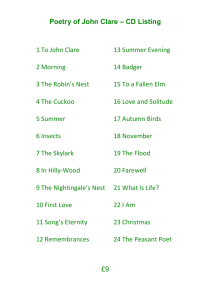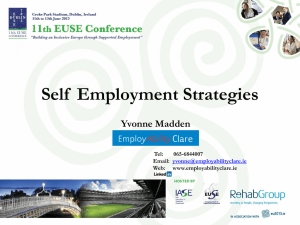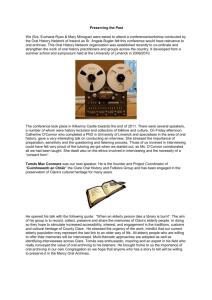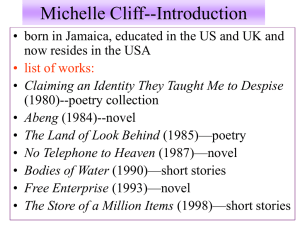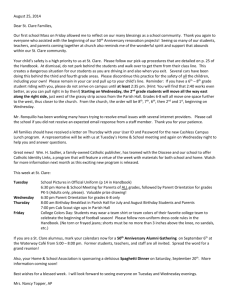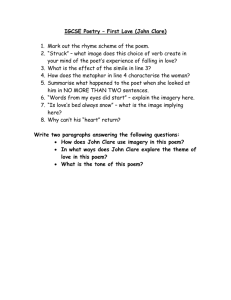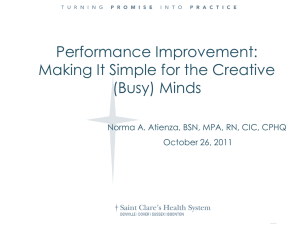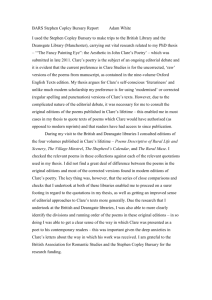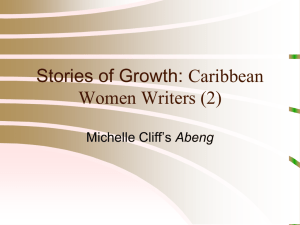Document
advertisement
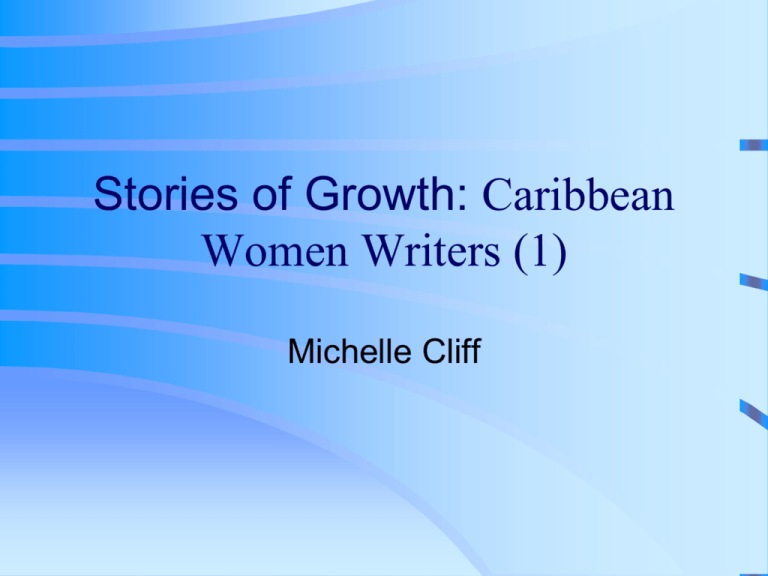
Stories of Growth: Caribbean Women Writers (1) Michelle Cliff Outline • Caribbean Women Writers: Major Themes • Michelle Cliff: Introd. • Abeng Chap 15-17 – hunting scene and its reasons; – bathing scene and what it reveals –gender and race – the issue of languages Caribbean Women Writers: Major Themes • female Bildungsroman: – stories of growth and development // the process of socialization as well as alienation – racial and class issues (black, white and mulatto) – + gender stereotypes and inequality • “Mother Country” vs mother land (relations to the Caribbean landscape) • education and mother-daughter relationship -- usually alienation the grandmother as the positive figure Working Miracles: Women’s Lives • absent father (mother) – child-shifting (adoptions –“Bright Thursdays” adopting to fill in an empty space for the grandparents 210) • Single mothers as breadwinners (1/2 of the Caribbean households are headed by women) • Outside children -- children born out of a father’s stable residential union; legitimacy is not an issue Olive Senior, Working Miracles: Women’s Lives in the English-Speaking Caribbean (Chapter 1) Michelle Cliff--Introduction • born in Jamaica (1946), educated in the US and UK and now resides in the USA • works: – Abeng (1984) –our excerpt – No Telephone to Heaven (1987) • “White Creole” Identity: – “My family was called red. A term which signified a degree of whiteness. . . . In the hierarchy of shades I was considered among the lightest. The countrywomen who visited my grandmother commented on my 'tall' hair - meaning long. Wavy, not curly (Cliff, 1985: 59). Michelle Cliff--Introduction • asked to pass as white • Sent to an all-girl boarding school and fell in love with a girl there. • The diary in which she wrote about it was read by her parents. They read it out loud to the other family members. (source) Michelle Cliff--Major Themes • Interaction of gender, sexual, class, racial identities • the issue of language • the importance of history and oral culture • “colourism” or color prejudice in Jamaica • the issue of passing (129) • “Passing demands a desire to become invisible. A ghost-life. An ignorance of connections…. Passing demands quiet. And from that quiet-silence.” --“Passing” (Cliff Claiming an Identity, 21) Passing: Examples • The Human Stain (film 2003) Novel by Philip Roth • Abeng – Kitty (black) -+ Boy (white) p. 129 The Meaning of Abeng • Abeng -- an African word meaning conch shell. • Two meanings: 1) The blowing of the conch called the slaves to the canefields in the West Indies. 2) The abeng has another use: it was the instrument used by the Maroon armies to pass their messages and reach one another.” --Abeng – about both colonial control and resistance to colonialism Characters in Abeng • (landed, red) Albert & Mattie Freeman; • Kitty Freeman * p. 128 •(colonists; planters) Samuel & Judith; •Judge Savage Boy Savage •Clare Savage; Jennie Savage • Ben (C’s cousin) & Joshua (half cousin) •Miss Ruthie (squatter, black) •the cane-cutter •Mass Cudjoe (the pig) * •Old Joe (the bull) Zoe The Savages • Judge -- burned his slaves alive on the eve of emancipation • “His mind was on a 'higher' plane--he was concerned about the survival of his race. He was fearful of the mixing that was sure to follow freedom--in which the white seed would be diluted and the race impoverished”(38). • “…He was not to blame. These people were slaves and would not know how to behave in freedom. They would have been miserable....... At that moment these people were his property, and they were therefore his to burn” (39-40) The Savages—not all whites • The Savages defined themselves according to "color, class, and religion, and over the years a carefully contrived mythology was constructed, which they used to protect their identities. When they were poor, and not all of them white, the mythology persisted" (Abeng 29). Kitty Freeman • "Kitty's mother was both Black and white, and her father's origins were unknown—but both had brown skin and a wave to their hair. • .... Her people were called 'red' and they knew that this was what they were. .. . The Freemans did not question this structure…” • [cause] “... a settling of blood as some lighter skins crossed over one or other of the darker ones--keeping guard, though, over a base of darkness. And a trickle of white people …made the island whiter than it actually was" (54). Cliff on Clare Savage • Clare Savage "is an amalgam of myself and others, who eventually becomes herself alone. Bertha Rochester is her ancestor. Her name, obviously, is significant and is intended to represent her as a crossroads character, with her feet (and head) in (at least) two worlds. • Clare: a light-skinned female who has been removed from her homeland in a variety of ways and whose life is a movement back, ragged, interrupted, uncertain, to that homeland. She is fragmented, damaged, incomplete.“ (e.g. her missing her mother) Cliff on Clare Savage • Savage: “Her surname is self-explanatory. It meant to evoke the wilderness that has been bleached from her skin, understanding that my use of the word wilderness is ironic, mocking the master’s meaning, turning instead to a sense of nonWestern values which are empowering and essential to survival, her survival, and wholeness. ("Clare Savage as a Crossroads Character" 264-5) Abeng: our excerpt • Chap 15: hunting episode • – The natural world outside the plantation; – Clare and hunting pp. 114 (Clare’s memory 115) – – Zoe’s persuasion: against hunting. pp. 116 • – Bathing pp. 119 (Clare’s reflection); – Cane-cutter’s interruption Chap 16: implication and causes of Clare’s acts – – – – Why shoot? Robert Clare Boy vs. Kitty Chap 17: consequences: – Zoe’s thinking – Clare’s facing the grandmother Abeng: Starting Questions • Why do you think Clare wants to go hunting? • Why is the cane-cutter’s sudden presence so embarrassing? The Hunting Episode in Context 1. – – – The history of natural lives//colonialism pp. 112 the origin of the pig--the native of the island the Maroon ritual and gender differences the mongoose • • • • from India (112) “the true survivor” (113) symbolic meaning—about hunting and survival; how the natural habitat has been changed by colonial practices Does Clare enjoy killing wild animals? What is the symbolic meaning of this hunting for Clare? pp. 114, 115, Clare’s motivation • She does not enjoy hunting (e.g. experience of eating goat and roasted birds); • Wanting to eat the pig’s testicles and penis? • Her mother Kitty, Kitty Hart, Anne Frank, Doreen Paxton • Joshua and Ben’s shooting birds and hunting for a pig. Clare and Zoe • What are the differences between Zoe and Clare? ( WSS -- Antoinette and Tia)? • Zoe: – calls Clare “town gal” class difference – is afraid of being thought of as “Guinea warrior, not gal pickney.” (117-118) gender limitation • Clare – split; “limited” (119); – recognize her “selfishness”; her lack of understanding of property and ownership (121)—Clare’s alienation from the native code; unconscious of her own class privilege Zoe & Clare (2):bathing scene • What is the significance of the bathing scene (119120, 124) in the episode? Is the relation between the two girls lesbian? • Why is Clare so afraid of being seen by the canecutter? • Why does Cliff follows it with a narration of “battyman” in Ch. 16? • How does the family describe the “battyman” Robert (125-126)? What has happened to him? What is the connection of Robert’s story with the relationship between Clare and Zoe? • What divides Clare and Zoe? Zoe & Clare (2):bathing scene • Self-definition & Communication p. 120; 124 (not be selfish again) – respecting class boundaries, but crossing gender-race ones. • Robert and the American negro (12426)// Clare and Zoe transgression of racial boundaries p. 127 Clare’s Split Racial Identities • Boy’s teaching of “race and color and lightening” (127) • Kitty’s influences: – Kitty’s cherish of darkness (127-128)—”keep darkness locked inside” (129)—melancholic – Kitty’s dream of setting up a local school (129130)--her distrust of British education and love of black culture--“Daffodils” vs the Maroon Girl (129) – Kitty’s preference for the darker daughter Jennie (129) and Clare’s sense of alienation from the mother (128) Clare’s love for Zoe (131) – Thinks Clare likes passing (129) Languages--English and Patois • What kind of language does Zoe use? What is the significance of different languages in the novel? (e.g. Clare to Zoe, to the cane-cutter, and to Ms. Mattie) (122, 134). Note: Pig Cudjoe • In Jamaica, the growing strength and frequency of attacks by these Maroon groups between the 1650s and 1680s erupted into a full-blown war--known as Cudjoe's War, after its Akan leader--by 1690. In 1739, the British empire sued for peace and signed a historic treaty--Cudjoe s Treaty--giving the once-enslaved Africans autonomy and recognition as free people. Note 2: Resisting Women in Jamaican history • (p. 128) • Nanny -- the legendary Maroon leader, famed both for her strategic prowess and for her ability catch a bullet between her buttocks and thereby return it whence it came (the novel p. 14) • Inez-- the descendant of Maroon and Miskito Indian parents; – imprisoned and raped by Clare's great-grandfather the judge and turned into his concubine, she capitalizes on his absence to escape, and in doing so takes pains to aid a group of rebellious slaves acquire a piece of land where they can live undisturbed – She aborts the fetus she carries with the help of Mma Alli, the sorceress References • Cliff, Michelle. "Clare Savage as a Corssroads Character." Caribbean Women Writers: Essays from the First International Conference. Ed. Selwyn R. Cudjoe. Wellesley, MA: Calaloux, 1990. 263-68. • Michelle Cliff http://www.answers.com/topic/michelle-cliff
